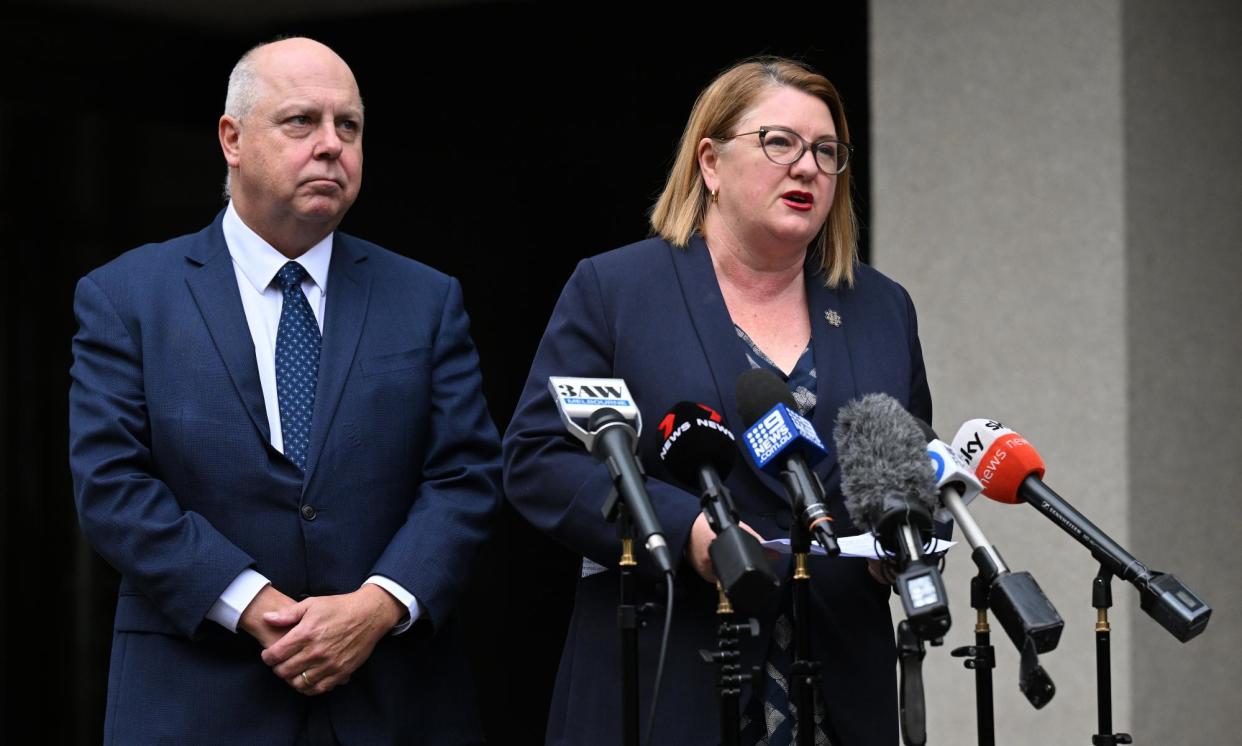Victoria signed MoU with Israeli defence ministry to share ‘opportunities’ from ‘global tensions’

The Victorian government quietly signed an agreement with Israel’s defence ministry in order to capitalise on “global tensions” and countries wanting to “protect their national interests” militarily, internal documents reveal.
The 2022 Memorandum of Understanding (MoU), signed prior to the Israel-Gaza war, was intended to foster trade relations and “support greater collaboration on defence industry objectives”, according to Victorian government documents released under freedom of information laws.
The existence of the MoU between the Department of Jobs, Skills, Industry and Regions and the International Defense Cooperation Directorate of the Israel Ministry of Defense was first reported by the ABC, but the exact details of its wording has not been released.
The text of the MoU was redacted in full in the documents provided to Guardian Australia. But, according to talking points prepared for its signing on 7 December 2022, the MoU’s purpose was to “foster trade relations between the Victorian and Israeli defence, aerospace, security and cybersecurity sectors”.
The notes cited “global tensions”, including the war in Ukraine and “increasingly militarised territorial disputes in our regions in the Pacific and Indo-Pacific ocean”. They said it was important to form strong “defence alliances and industry cooperation” between governments that “share the same interests”.
“Globally countries are investing significant funds to protect their national interests with military capabilities aligned to this environment,” the speaking notes read.
“This MoU is a pathway for meaningful cooperation between Israel and the state of Victoria to capture and share these opportunities.”
The Victorian minister for jobs and industry, Natalie Hutchins, said the government was “not supplying arms or weapons to Israel” and the agreement was not legally binding.
“The purpose of this MoU is to identify potential opportunities for collaboration on projects that can deliver significant advanced manufacturing capabilities, highly skilled jobs and economic benefits for Victoria,” she said in a statement.
“No joint projects have been identified or entered into under the MoU.”
Prior to the MoU, several suppliers to the Israeli defence forces had already established a presence in Melbourne. They include Elbit Systems, which established the Centre of Excellence for Human-Machine Teaming and Artificial Intelligence in Port Melbourne in 2021 with investment from the Victorian government.
Despite the MoU being signed in 2022, an event briefing before its signing warned the department it would face criticism from civil society organisations and the Victorian Greens for its “engagement or cooperation with Israel and companies in its defence and security industries”.
“Israel’s ongoing conflict with Palestine continues to attract public and media attention, with the Victorian government already facing criticism for its provision of a grant to Elbit Systems Australia,” the brief reads.
‘Fairly standard’ or ‘shocking’? Experts weigh in
Jennifer Parker, expert associate at the ANU National Security College, said the language used to describe the MoU was unsurprising.
“This is a fairly standard agreement, obviously signed prior to the current conflict, which is about promoting a state’s defence industry. I’d be surprised if other states didn’t have similar agreements with other countries,” Parker said.
She said Victoria had a “significant” defence industry, known for its infantry fighting vehicles and ammunition, that could learn from Israel, which is considered a world leader in defence technology.
“For a relatively small nation, Israel has developed a pretty high-profile defence industry where they actually export to a significant number of nations,” Parker said.
“In terms of understanding how they’ve managed to build up their industries to do that, I think there are good lessons there for Victoria. But I do think that this needs to be put in the context of when this MoU was signed.”
But Rawan Arraf, the principal lawyer and executive director of the Australian Centre for International Justice, said it was “shocking” the Victorian government went ahead with the agreement and urged its scrapping.
“The Victorian government must drop all pretence about the importance of this relationship for national security or job growth, and cancel this offensive MoU,” she said.
“Israel’s defence industry has long relied on testing its new technologies against Palestinians with catastrophic consequences.”
The documents also reveal the MoU was set to be signed by the Israeli president in 2020, but the event was cancelled due to Covid-19.
But later that year, new federal laws giving the foreign affairs minister the power to veto international agreements reached by state, territory and local governments and public universities were introduced. This meant the Victorian government had to seek federal approval before each stage of the process.
In January 2022 the then acting foreign affairs minister, Simon Birmingham, allowed the state government to begin negotiations with Israel before his successor, Labor’s Tim Watts, allowed Victoria to enter the agreement later that year.
Another briefing document showed it was Israel’s preference for the signing to take place there, and offered to “facilitate travel for Victorian government representatives to Israel or a third location to sign the MoU”.
But the department said it would not be possible, citing to “competing demands” and “caretaker arrangements” due to a looming state election.
The same briefing recommended the Victorian government request its MoU to be exempt from the public register, given its “sensitive contents and its linkage with national security”.


